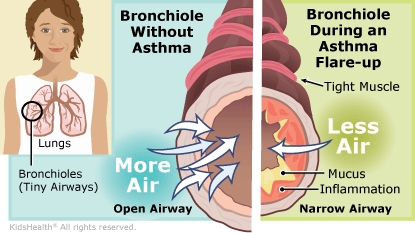Lots of kids have asthma. For kids with a certain type of asthma, called "cough-variant" asthma, coughing is the main symptom of a flare-up. Coughing may get worse at night, during or after exercise, in cold weather, or when your child is around allergens or other triggers.



Your child:

Your child has trouble breathing. Signs you might see include:
Call 911 if your child is struggling to breathe, is too out of breath to talk or walk, or turns blue.

What is an asthma flare-up? An asthma flare-up is when asthma symptoms get worse. In kids with cough-variant asthma, this means they cough a lot more. Just like in other people with asthma, their airways are overly sensitive to some things (called "triggers"). Being around triggers can bring on coughing by making the airways in the lungs narrower, swollen, and filled with mucus. Asthma flare-ups are also called asthma attacks or exacerbations. An asthma flare-up can happen even when a person takes medicine to control their asthma.
What are common asthma triggers? Triggers can bring on asthma symptoms, but they don't cause asthma. Triggers are different for each person with asthma, but common ones include:
How do asthma medicines work? Asthma medicines generally work in two ways:
Some children will get both types of medicines from one inhaler device. They might need to use this "combination" inhaler every day, with added doses from it when they have symptoms. Some older kids with mild asthma might use a combination inhaler only for quick relief when they have symptoms, or before they exercise. Your health care team will help you figure out which inhaler is best for your child, and how and when to use it.
Are all asthma medicines breathed in, or can some be taken by mouth? Some medicines that ease inflammation can also be taken by mouth. For example, the health care provider may prescribe oral steroids for inflammation during a flare-up, usually for 5–7 days.